高考英语非谓语动词总结改错
- 格式:doc
- 大小:26.85 KB
- 文档页数:16

高考英语作文中非谓语动词容易出错的句子全文共3篇示例,供读者参考篇1Non-Finite Verbs are Tricky!Hi there! My name is Lily and I'm 10 years old. I love learning English but some things are really hard, like non-finite verbs. What are those? Well, they are verb forms that don't act as the main verb in a sentence. There are three types - infinitives, gerunds, and participles. Using them correctly can be confusing, even for older students studying for the big Gaokao exam!Let me tell you about some common mistakes people make with infinitives first. An infinitive is the basic form of a verb with "to" in front, like "to run" or "to study". You need an infinitive after certain verbs like "want", "need", "try". For example: "I want to become a doctor when I grow up." But you can't say "I promising to study hard" - instead you need "I promise to study hard." Mixing up when to use the infinitive form is a super common error.Gerunds are another tricky one. A gerund is the -ing form of a verb used as a noun, like "reading" or "swimming". You can usea gerund after certain verbs like "enjoy", "dislike", "continue". For instance: "I enjoy reading books." But you can't say "I like To read books" - that's incorrect. A lot of people accidentally use the infinitive instead of the gerund in sentences like that.Then there are participles, which are -ing or -ed verb forms used as adjectives, like "running" or "baked". For example: "The running boy fell down." A common mistake is saying something like "The boy running fell down" which doesn't make sense in English. The participle has to directly modify a noun.Using participles incorrectly in phrases is another biggie. You should say "Having finished his homework, Tim went outside to play." Not "Having finished his homework, Tim went outside and played." See the difference? That second one is just wrong. You also can't put a participle without having a noun or pronoun to modify, like "Finishing the exam, was a relief." It should be "Having finished the exam was a relief."Phew, I'm getting a little tongue-tied trying to explain all the rules! Even though I'm just a kid, I know how confusingnon-finite verbs can be. No wonder so many Gaokao students make mistakes with them when writing their English essays and answers.My advice? Practice, practice, practice with lots of examples. Pay close attention to whether a sentence needs an infinitive, gerund, or participle. And don't be afraid to make mistakes - that's how we learn! Just keep reviewing the different cases and eventually, it will start to click. Maybe sometime I'll be good enough at non-finite verbs to ace the Gaokao myself. But I've got a loooong way to go until then!Thanks for letting me share what I know about this tricky grammar topic. I hope it helps my fellow English learners! Let me know if you have any other questions.篇2Non-Finite Verb Whoopsies in English Exam WritingHi there! Polly here, an 8-year-old English learner. Today I want to talk about some really tricky sentences that give me a headache when writing English essays and stories for exams. These sentences have weird verb forms that don't act like normal verbs. They're called "non-finite verbs" which is a super fancy name if you ask me!The first kind that's mega confusing are infinitives. These are verb forms with "to" in front, like "to run", "to jump", "to sleep". You use them after certain other verbs, like "I want to play" or"She decided to study". But things get muddled when you use them in other ways, like:"The best dessert to eat is ice cream."Whoops, that's not quite right! You're not supposed to use the infinitive "to eat" there. It should be just the simple verb "eat" - "The best dessert to eat is ice cream."Another trap is using infinitives incorrectly after adjectives:"She felt happy to winning the prize."Ack, wrong again! After adjectives like "happy", you need to use the infinitive without "to", so it should be "She felt happy to win the prize."Those sneaky infinitives really love to cause trouble! But you know what's even trickier? Gerunds! These are verb forms that end in "-ing" and act like nouns. Like "Swimming is fun" or "I love reading books." Using gerunds right is a huge challenge.One place they get me is after prepositions. I'll write things like:"I'm good at to swim."But that's just plain wrong. After prepositions you absolutely must use the gerund form, no "to"! It should be "I'm good at swimming."Another gerund goof I make is using them incorrectly after certain verbs, like:"I considered taking a break."Looks okay, right? Wrong! You're supposed to use an infinitive after "considered", not a gerund. It should be "I considered to take a break."See why gerunds drive me bananas? And you know what's the most bananasiest of all? Participles! Participles are those "-ing" or "-ed" verb forms that act like adjectives, like "the baking bread" or "the bored students". Putting participles in the right places is super hard.Like, I'll make mistakes like this:"Watching the movie bored me.""Bored" is supposed to be a participle adjective modifying "me", but it sounds like the movie did the boring, not me! To fix it, you'd say "The movie was boring" or "I was bored watching the movie."Or I'll write:"The running boy ran faster."Argh, that's all kinds of wrong! The "running" there is acting like a noun, not a participle adjective modifying "boy". It should be "The boy running ran faster."Participles love to make my brain tie itself in knots. When I have to describe something using multiple participles, things get really messy:"The walking across the street hitting by a car boy was rushed to the hospital."Yikes! My head hurts just looking at that tangle of participles. It should be:"The boy who was walking across the street and was hit by a car was rushed to the hospital."Phew, I got a little carried away venting there! The point is, non-finite verbs like infinitives, gerunds, and participles are super duper tricky to use properly in English writing. They're the grammatical banana peels that make me slip up over and over on tests and exams.I bet I've made a dozen mistakes with them in this essay alone! But I'm going to keep practicing using them right. One day, those sneaky non-finite verbs won't be able to trick me anymore. Until then, I'll just keep bonking my head and learning from my whoopsies. Wish me luck!篇3Making Sense of Non-Finite VerbsHi there, friends! It's me, your pal Emily. Today, I want to talk to you about something that can be really tricky in English writing – non-finite verbs! Don't worry, I'll explain what those are in a sec. But first, let me tell you a quick story.Last week, my teacher Mrs. Johnson gave us an assignment to write a short essay about our favorite weekend activity. I wrote all about going to the park with my dog Buddy. When I got my essay back, there were a bunch of red marks all over it! Mrs. Johnson had circled some of the verbs I used, like "going" and "walking." She said I had made mistakes with something called "non-finite verbs."At first, I was really confused. What in the world arenon-finite verbs? They sound like some kind of weird math thing! But Mrs. Johnson explained it to me, and you know what? Itactually makes a lot of sense once you understand it. So let me break it down for you.Non-finite verbs are verb forms that don't show tense or person. That means they don't change based on when the action happened (past, present, future) or who did it (I, you, he, she, etc.). The main non-finite verb forms are:Infinitives (to + verb): to play, to sing, to danceGerunds (-ing form used as a noun): playing, singing, dancingParticiples (used to modify nouns/pronouns): playing, played, sung, dancedGot it so far? Great! Now, here's where things can get a little tricky. We have to use these non-finite verbs correctly in sentences. If we don't, it's easy to make mistakes. Let me give you some examples of common mistakes:Incorrect: I enjoyed playing with my dog after finishing my homework.Correct: I enjoyed playing with my dog after I had finished my homework.See the difference? In the incorrect sentence, "finishing" is a present participle that doesn't agree with the past tense "enjoyed." We need the past participle "finished" to make it correct.Here's another one:Incorrect: My favorite hobby is to hiking in the mountains.Correct: My favorite hobby is hiking in the mountains.With "to hike" being an infinitive, we don't need "to" before the gerund "hiking." It's redundant!One more example:Incorrect: The movie about the superhero fighting evil was exciting.Correct: The movie about the superhero fighting evil was exciting.Did you spot the error? You're right, there isn't one! This sentence uses the present participle "fighting" correctly to modify "superhero."Making mistakes with non-finite verbs is really common, even for grown-ups who have been speaking English their wholelives. But the more you practice, the better you'll get at using them properly.The key things to remember are:Infinitives follow words like "to," "in order to," and "so as to."Gerunds act as nouns and often follow possessive pronouns or prepositions.Participles modify nouns/pronouns and must agree in tense.I know it seems like a lot of rules, but trust me, it gets easier with time and practice. Just pay close attention when you're writing, and don't be afraid to ask your teacher for help if you get stuck. We're all learning together!Well, that's all I've got for you today on the adventures of non-finite verbs. Thanks for listening, friends! Let's all keep working hard and having fun while we practice our writing skills. Catch you later!。
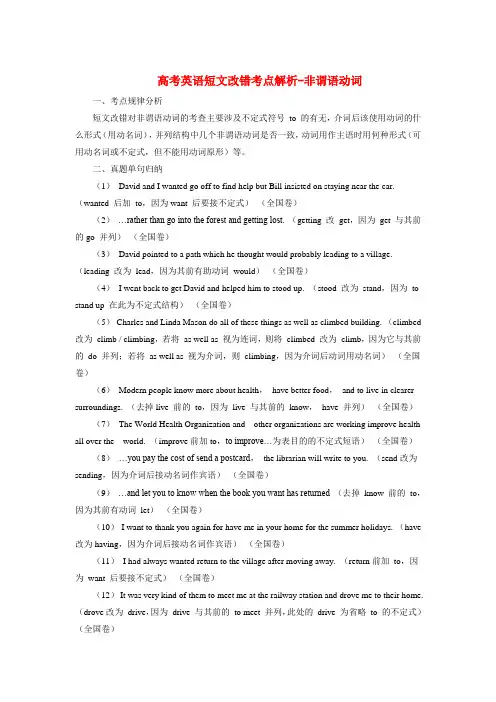
高考英语短文改错考点解析-非谓语动词一、考点规律分析短文改错对非谓语动词的考查主要涉及不定式符号to 的有无,介词后该使用动词的什么形式(用动名词),并列结构中几个非谓语动词是否一致,动词用作主语时用何种形式(可用动名词或不定式,但不能用动词原形)等。
二、真题单句归纳(1)David and I wanted go off to find help but Bill insisted on staying near the car. (wanted 后加to,因为want 后要接不定式)(全国卷)(2)…rather than go into the forest and getting lost. (getting 改get,因为get 与其前的go 并列)(全国卷)(3)David pointed to a path which he thought would probably leading to a village. (leading 改为lead,因为其前有助动词would)(全国卷)(4)I went back to get David and helped him to stood up. (stood 改为stand,因为to stand up 在此为不定式结构)(全国卷)(5)Charles and Linda Mason do all of these things as well as climbed building. (climbed 改为climb / climbing,若将as well as 视为连词,则将climbed 改为climb,因为它与其前的do 并列;若将as well as 视为介词,则climbing,因为介词后动词用动名词)(全国卷)(6)Modern people know more about health,have better food,and to live in clearer surroundings. (去掉live 前的to,因为live 与其前的know,have 并列)(全国卷)(7)The World Health Organization and other organizations are working improve health all over the world. (improve前加to,to improve…为表目的的不定式短语)(全国卷)(8)…you pay the cost of send a postcard,the librarian will write to you. (send改为sending,因为介词后接动名词作宾语)(全国卷)(9)…and let you to know when the book you want has returned (去掉know 前的to,因为其前有动词let)(全国卷)(10)I want to thank you again for have me in your home for the summer holidays. (have 改为having,因为介词后接动名词作宾语)(全国卷)(11)I had always wanted return to the village after moving away. (return前加to,因为want 后要接不定式)(全国卷)(12)It was very kind of them to meet me at the railway station and drove me to their home. (drove改为drive,因为drive 与其前的to meet 并列,此处的drive 为省略to 的不定式)(全国卷)(13)I look forward to hear from you soon. (hear改为hearing,因为其前的to 是介词)(全国卷)(14)Play football not only makes us grow up tall and strong but also gives us a sense of fair play and team spirit. (第一个play改为playing,因为动词原形不能用作主语)(全国卷)(15)I was often a little tired after a day‘s work and watch TV demands very little effort. (watch改为watching,因为动词原形不能用作主语)(全国卷)(16)I‘d like v ery much come but I have an examination on Monday morning. (come 前加to,因为would like 后接不定式)(北京春季卷)(17)I‘ll spend the whole weekend reading and prepare for it. (prepare 改为preparing,因为它与其前的reading 并列,与其前所用的动词spend 有关)(北京春季卷)(18)But then there is always more mysteries look into. (look 前加to,此处为不定式作后置定语)(北京春季卷)(19)After learn the basics of the subject,nothing else seemed very practical to me. (learn 改为learning,因为介词后接动名词作宾语)(北京春季卷)(20)My parents love me dearly of course and will do all they can make sure that I get a good education. (make 前加to,因为to make… 在此用作目的状语,注意句型do all one can to do sth)(全国卷)(21)He did not want share things with other people. (want 后加to,因为want 后要接不定式)(北京春季卷)(22)That is, a game of tennis making him very busy. (making 改为made,因为缺谓语,不能用非谓语形式,根据上下文用一般过去时)(北京春季卷)(23)As we climbed the mountain,we fed monkeys,visiting temples and told stories. (visiting 改为visited,因为它与其前的fed 和其后的told 并列)(全国卷)(24)But his parents think go to college is more important than playing sports. (go 改为going,因为动词原形不能用作主语)(安徽春季卷)(25)…children may not develop the habit of read and the ability to enjoy themselves. (read 改为reading,因为介词后要接动名词)(年北京春季卷)(26)…to make children to want things that they don‘t really need.(去掉want 前的to,因为want…在此用作使役动词make 的宾语补足语)(年北京春季卷)(27)Soon I began to enjoy talk to myself on paper as I was learning to express myself in simple English. (talk 改为talking,因为动词enjoy 后要接动名词作宾语)(全国卷)(28)Shake her head,she said,“It isn‘t a good time to do that,dear.” (Shake 改为Shaking,现在分词表伴随)(江苏卷)(29)It‘s like going to a huge library without have to walk around to find your books. (have 改为having,介词后用动名词作宾语)(广西卷)(30)I am thinking of making a trip to London,and visit the British Museum and some parks. (visit 改为visiting,因visit与making并列,作介词of的宾语)(四川卷)(31)I have some records giving to me as birthday gifts.(giving 改为given,“把某物给某人”是give sth to sb;句中records与give是被动关系,故用过去分词)(32)I dream of standing on the platform in the classroom and give lessons to lovely boys and girls. (give改为giving,因它与standing并列,作dream of的宾语)三、模拟单句演练(1)In those days we were forced work twelve hours a day.(2)It‘s very difficult for a foreigner learn Chinese.(3)It was silly of you believe what he said.(4)He was made wash the boss‘s car o nce a day.(5)I‘ll let you to know as soon as I hear from her.(6)I waved to her but failed attract her attention.(7)I have already seen the film twice. I don‘t want see it any more.(8)What I want know is when all this happened.(9)It was clear that he wanted be alone.(10)Most children are interested in listen to stories.(11)Walk quickly is difficult for an old man.(13)Be careful in cross the street.(14)The film is very interesting. It is worth see twice.(15)Find work is very difficult these days.(16)Most of us students enjoy ask questions in English.(17)Look,some of my classmates are practising speak English over there.(18)Teach a child to sing and dance is very interesting.(19)Learn to speak English is more difficult than to write it.(20)My friend Jim is very good at making things and repair things.(21)He decided to go to the south,find a good job and living there.(22)It was very kind of you to buy us some much fruit and seeing us at the station.(23)Excuse me,would you to tell me the way to the zoo?「参考答案」(1)work 前加to,此句为force sb to do sth 的被动形式。
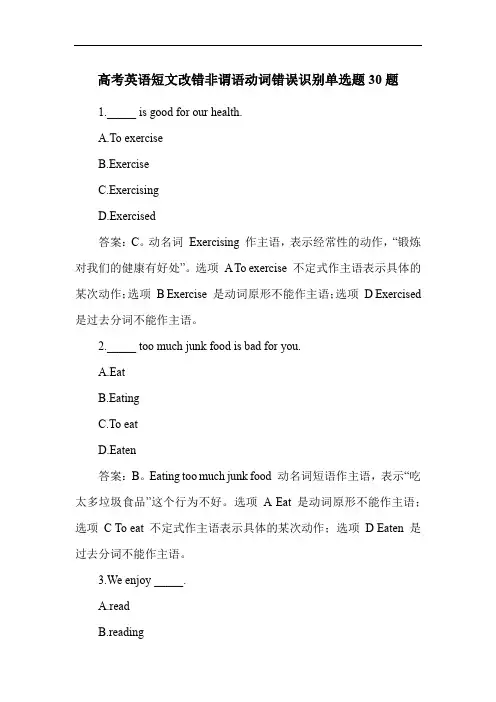
高考英语短文改错非谓语动词错误识别单选题30题1._____ is good for our health.A.To exerciseB.ExerciseC.ExercisingD.Exercised答案:C。
动名词Exercising 作主语,表示经常性的动作,“锻炼对我们的健康有好处”。
选项A To exercise 不定式作主语表示具体的某次动作;选项B Exercise 是动词原形不能作主语;选项D Exercised 是过去分词不能作主语。
2._____ too much junk food is bad for you.A.EatB.EatingC.To eatD.Eaten答案:B。
Eating too much junk food 动名词短语作主语,表示“吃太多垃圾食品”这个行为不好。
选项 A Eat 是动词原形不能作主语;选项C To eat 不定式作主语表示具体的某次动作;选项D Eaten 是过去分词不能作主语。
3.We enjoy _____.A.readB.readingD.reads答案:B。
enjoy 后面接动名词作宾语,“我们喜欢阅读”。
选项 A read 是动词原形;选项C to read 是不定式;选项D reads 是第三人称单数形式。
4.She is fond of _____.A.singB.singingC.to singD.sings答案:B。
be fond of 后面接动名词作宾语,“她喜欢唱歌”。
选项A sing 是动词原形;选项C to sing 是不定式;选项D sings 是第三人称单数形式。
5.He suggested _____.A.goB.goingC.to goD.goes答案:B。
suggest 后面接动名词作宾语,“他建议去……”。
选项A go 是动词原形;选项C to go 是不定式;选项D goes 是第三人称单数形式。
6._____ English well is important.B.LearningC.To learnD.Learned答案:B。
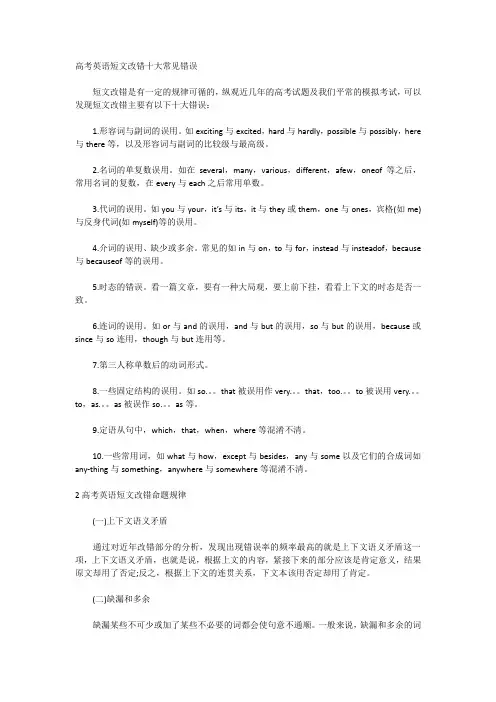
高考英语短文改错十大常见错误短文改错是有一定的规律可循的,纵观近几年的高考试题及我们平常的模拟考试,可以发现短文改错主要有以下十大错误:1.形容词与副词的误用。
如exciting与excited,hard与hardly,possible与possibly,here 与there等,以及形容词与副词的比较级与最高级。
2.名词的单复数误用。
如在several,many,various,different,afew,oneof等之后,常用名词的复数,在every与each之后常用单数。
3.代词的误用。
如you与your,it’s与its,it与they或them,one与ones,宾格(如me)与反身代词(如myself)等的误用。
4.介词的误用、缺少或多余。
常见的如in与on,to与for,instead与insteadof,because 与becauseof等的误用。
5.时态的错误。
看一篇文章,要有一种大局观,要上前下挂,看看上下文的时态是否一致。
6.连词的误用。
如or与and的误用,and与but的误用,so与but的误用,because或since与so连用,though与but连用等。
7.第三人称单数后的动词形式。
8.一些固定结构的误用。
如so.。
that被误用作very.。
that,too.。
to被误用very.。
to,as.。
as被误作so.。
as等。
9.定语从句中,which,that,when,where等混淆不清。
10.一些常用词,如what与how,except与besides,any与some以及它们的合成词如any-thing与something,anywhere与somewhere等混淆不清。
2高考英语短文改错命题规律(一)上下文语义矛盾通过对近年改错部分的分析,发现出现错误率的频率最高的就是上下文语义矛盾这一项,上下文语义矛盾,也就是说,根据上文的内容,紧接下来的部分应该是肯定意义,结果原文却用了否定;反之,根据上下文的连贯关系,下文本该用否定却用了肯定。
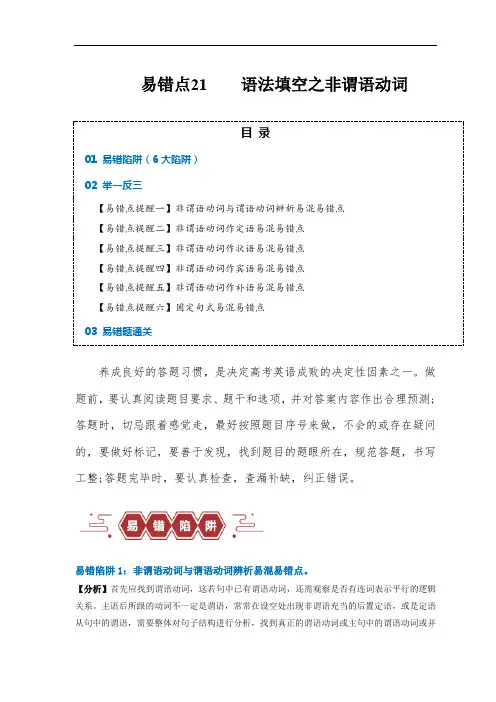
易错点21 语法填空之非谓语动词目录01 易错陷阱(6大陷阱)02 举一反三【易错点提醒一】非谓语动词与谓语动词辨析易混易错点【易错点提醒二】非谓语动词作定语易混易错点【易错点提醒三】非谓语动词作状语易混易错点【易错点提醒四】非谓语动词作宾语易混易错点【易错点提醒五】非谓语动词作补语易混易错点【易错点提醒六】固定句式易混易错点03 易错题通关养成良好的答题习惯,是决定高考英语成败的决定性因素之一。
做题前,要认真阅读题目要求、题干和选项,并对答案内容作出合理预测;答题时,切忌跟着感觉走,最好按照题目序号来做,不会的或存在疑问的,要做好标记,要善于发现,找到题目的题眼所在,规范答题,书写工整;答题完毕时,要认真检查,查漏补缺,纠正错误。
易错陷阱1:非谓语动词与谓语动词辨析易混易错点。
【分析】首先应找到谓语动词,这若句中已有谓语动词,还需观察是否有连词表示平行的逻辑关系。
主语后所跟的动词不一定是谓语,常常在设空处出现非谓语充当的后置定语,或是定语从句中的谓语,需要整体对句子结构进行分析,找到真正的谓语动词或主句中的谓语动词或并列的谓语动词,而剩下就很可能是非谓语动词。
易错陷阱2:非谓语动词作定语易混易错点。
【分析】非谓语作后置定语时,容易被误判为谓语动词,故应当审查全句。
后置定语重在判断非谓语动词与所修饰名词之间的主、被动关系以及不规则动词的词形变化。
易错陷阱3:非谓语动词作状语易混易错点。
【分析】首先应当判断非谓语动词是否表示目的,目的在于只能用动词不定式充当。
若充当条件、方式、伴随等状语,则主要判断其与主语之间的主、被动关系。
目的状语用于句中时,不能用逗号,句首则可以。
作结果状语时,不定式表示出乎意料的结果,分词表示自然、可想而知的结果。
易错陷阱4:非谓语动词作宾语易混易错点。
【分析】牢记在以下动词后,只能跟动词的-ing形式作宾语。
1.consider, suggest, advise, admit, delay, practise, deny, finish, enjoy, appreciate, forbid, imagine, risk, mind, allow, permit, escape等。
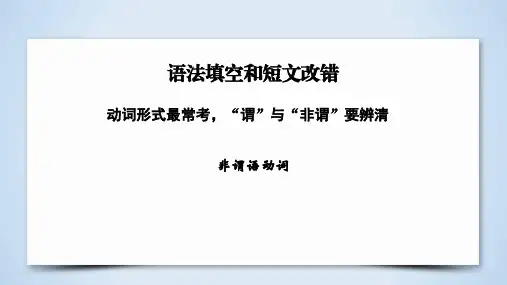

高考英语语法填空与短文改错知识点归纳总结(含答案)一、名词旳数语法填空1. ( 全国 I 卷 62) This trend, ... , has had some unintended side62 (effect) such as overweight and heart disease—the very thing themedical community was trying to fight.解析:effects表达“某些意料外旳副作用”,故用复数。
2. ( 全国 II 卷 61) It ran for just under seven kilometers and allowedpeople to avoid terrible 61 (crowd) on the roads...解析:crowds防止拥挤旳人群。
3. ( 全国III卷 67) She has turned down several 67 (invitation)to star at shows in order to concentrate on her studies.解析:invitations由前面旳several可知,要用复数形式。
短文改错解析:word-*words背面有并列旳三句话,故word用复数words。
解析:informations-information因information是不可数名词,没有复数形式。
二、代词阅读理解Some of the world’s most famous musicians recently gathered in Paris and New Orleans to celebrate the first an nual International Jazz Day...Despite the celebrations, though, in the U. S. the jazz audience continues to shrink and grow older, and the mu sic has failed to connect with younger generations.en the audience for jazz, make the music more accessible, and preserve its history and culture.29. What does the underlined word “that” in Paragraph 3 refer to?A. Jazz becoming more accessible.B. The production of jazz growing faster.C. Jazz being less popular with the young.D. The jazz audience becoming larger.解析:指代前句中即前一段旳最终一句中旳the music has failed to connect 6with younger generations,比较各选项,只有C对旳。
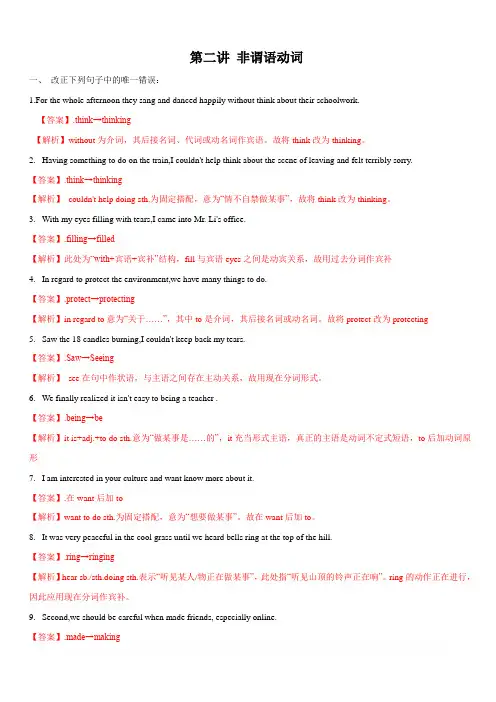
第二讲非谓语动词一、改正下列句子中的唯一错误:1.For the whole afternoon they sang and danced happily without think about their schoolwork.【答案】.think→thinking【解析】without为介词,其后接名词、代词或动名词作宾语。
故将think改为thinking。
2.Having something to do on the train,I couldn't help think about the scene of leaving and felt terribly sorry.【答案】.think→thinking【解析】couldn't help doing sth.为固定搭配,意为“情不自禁做某事”,故将think改为thinking。
3.With my eyes filling with tears,I came into Mr. Li's office.【答案】.filling→filled【解析】此处为“with+宾语+宾补”结构,fill与宾语eyes之间是动宾关系,故用过去分词作宾补4.In regard to protect the environment,we have many things to do.【答案】.protect→protecting【解析】in regard to意为“关于……”,其中to是介词,其后接名词或动名词。
故将protect改为protecting5.Saw the 18 candles burning,I couldn't keep back my tears.【答案】.Saw→Seeing【解析】see在句中作状语,与主语之间存在主动关系,故用现在分词形式。
6.We finally realized it isn't easy to being a teacher .【答案】.being→be【解析】it is+adj.+to do sth.意为“做某事是……的”,it充当形式主语,真正的主语是动词不定式短语,to后加动词原形7.I am interested in your culture and want know more about it.【答案】.在want后加to【解析】want to do sth.为固定搭配,意为“想要做某事”。
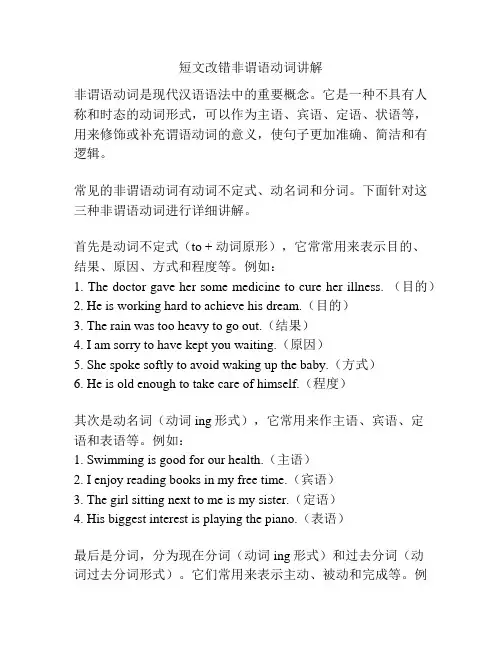
短文改错非谓语动词讲解非谓语动词是现代汉语语法中的重要概念。
它是一种不具有人称和时态的动词形式,可以作为主语、宾语、定语、状语等,用来修饰或补充谓语动词的意义,使句子更加准确、简洁和有逻辑。
常见的非谓语动词有动词不定式、动名词和分词。
下面针对这三种非谓语动词进行详细讲解。
首先是动词不定式(to + 动词原形),它常常用来表示目的、结果、原因、方式和程度等。
例如:1. The doctor gave her some medicine to cure her illness. (目的)2. He is working hard to achieve his dream.(目的)3. The rain was too heavy to go out.(结果)4. I am sorry to have kept you waiting.(原因)5. She spoke softly to avoid waking up the baby.(方式)6. He is old enough to take care of himself.(程度)其次是动名词(动词ing形式),它常用来作主语、宾语、定语和表语等。
例如:1. Swimming is good for our health.(主语)2. I enjoy reading books in my free time.(宾语)3. The girl sitting next to me is my sister.(定语)4. His biggest interest is playing the piano.(表语)最后是分词,分为现在分词(动词ing形式)和过去分词(动词过去分词形式)。
它们常用来表示主动、被动和完成等。
例如:1. Seeing is believing.(主动)2. The broken glass needs to be cleaned up.(被动)3. She was impressed by the book written by the young author.(完成)需要注意的是,在使用非谓语动词时,需要注意上下文的语法和逻辑关系,避免出现主谓不一致的情况。
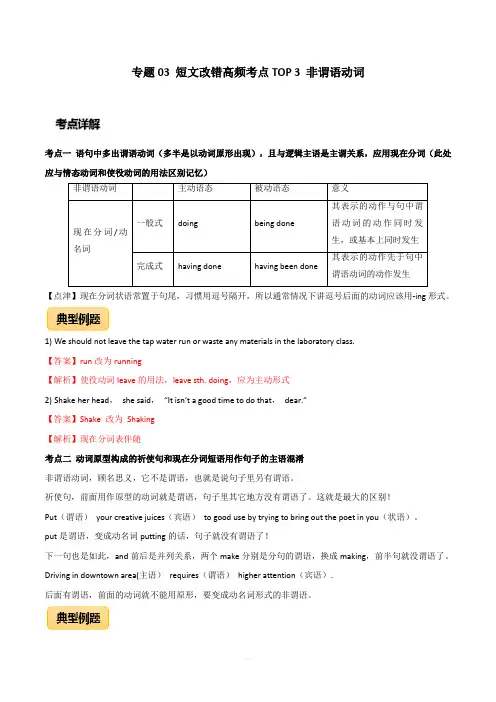
专题03 短文改错高频考点TOP 3 非谓语动词考点一语句中多出谓语动词(多半是以动词原形出现),且与逻辑主语是主谓关系,应用现在分词(此处应与情态动词和使役动词的用法区别记忆)非谓语动词主动语态被动语态意义现在分词/动名词一般式doing being done其表示的动作与句中谓语动词的动作同时发生,或基本上同时发生完成式having done having been done其表示的动作先于句中谓语动词的动作发生【点津】现在分词状语常置于句尾,习惯用逗号隔开,所以通常情况下讲逗号后面的动词应该用-ing形式。
1)We should not leave the tap water run or waste any materials in the laboratory class.【答案】run改为running【解析】使役动词leave的用法,leave sth. doing,应为主动形式2)Shake her head,she said,“It isn‘t a good time to do that,dear.”【答案】Shake 改为Shaking【解析】现在分词表伴随考点二动词原型构成的祈使句和现在分词短语用作句子的主语混淆非谓语动词,顾名思义,它不是谓语,也就是说句子里另有谓语。
祈使句,前面用作原型的动词就是谓语,句子里其它地方没有谓语了。
这就是最大的区别!Put(谓语)your creative juices(宾语)to good use by trying to bring out the poet in you(状语)。
put是谓语,变成动名词putting的话,句子就没有谓语了!下一句也是如此,and前后是并列关系,两个make分别是分句的谓语,换成making,前半句就没谓语了。
Driving in downtown area(主语)requires(谓语)higher attention(宾语).后面有谓语,前面的动词就不能用原形,要变成动名词形式的非谓语。

第七讲非谓语动词一、改正下列句子中的唯一错误:1.For the whole afternoon they sang and danced happily without think about their schoolwork.【答案】.think→thinking【解析】without为介词,其后接名词、代词或动名词作宾语。
故将think改为thinking。
2.Having something to do on the train,I couldn't help think about the scene of leaving and felt terribly sorry.【答案】.think→thinking【解析】couldn't help doing sth.为固定搭配,意为“情不自禁做某事”,故将think改为thinking。
3.With my eyes filling with tears,I came into Mr. Li's office.【答案】.filling→filled【解析】此处为“with+宾语+宾补”结构,fill与宾语eyes之间是动宾关系,故用过去分词作宾补4.In regard to protect the environment,we have many things to do.【答案】.protect→protecting【解析】in regard to意为“关于……”,其中to是介词,其后接名词或动名词。
故将protect改为protecting 5.Saw the 18 candles burning,I couldn't keep back my tears.【答案】.Saw→Seeing【解析】see在句中作状语,与主语之间存在主动关系,故用现在分词形式。
6.We finally realized it isn't easy to being a teacher .【答案】.being→be【解析】it is+adj.+to do sth.意为“做某事是……的”,it充当形式主语,真正的主语是动词不定式短语,to后加动词原形7.I am interested in your culture and want know more about it.【答案】.在want后加to【解析】want to do sth.为固定搭配,意为“想要做某事”。
全国高考二卷语法填空及短文改错分类复习资料系列-- 一非谓语动词2014—2018高考语法填空题及改错分类汇编及近期错题集(一).2014--2018全国卷语法填空非谓语动词考查(共28个)2018(I)1) You don’t have to run fast or for long _____________(see) the benefit.2) You may drink, smoke, be overweight and still reduce your risk of _________(die) early by running.2018(II)1) The government encourages farmers to grow corn instead of rice _______(improve) water quality.2) China’s approach to protecting its environment while ___________(feed) its citizens…2018(III)1)I quickly lower myself, ducking my head to avoid ___________(look) directly into his eyes so he doesn’t feel ______________(challenge).2) Once his message was delivered, he allowed me ___________( stay) and watch.2017(I)1)Fat and salt are very important parts of a diet. They are required _____________ (process) the food that we eat, to recover from injury and for several other bodily functions.2) …by ____________(eat) more fast food people will get more salt and fat than theyneed in their diet.2017(II)1) This included digging up the road, ______________( lay) the track and then building a strong roof over the top.2017(III)1) But unlike her school friends,16-year-old Sarah is not spending half-term _______(rest).2) But Sarah, who has taken part in shows along with top models, wants ___________( prove) that she has brains as well as beauty.2016(I)1) …I was the first Western TV reporter ____________(permit) to film a special unit…2) My ambassadorial duties will include _____________( introduce) British visitors to the 120-plus pandas…2016(II)…you’ll be less likely ___________(bring) your work home.2016(III)1) Skilled workers also combine various hardwoods and metal ___________(create) special designs.2) People probably cooked their food in large pots,_________( use) twigs (树枝) to remove it.2015(I)1) A study of travelers ____________(conduct) by the website Trip Advisor names Yangshuo as one of the top 10 destinations in the world.2) Abercrombie & Kent, a travel company in Hong Kong, says it regularly arranges quick getaways here for people __________ (live) in Shanghai and Hong Kong.2015(II)1)The adobe dwellings(土坯房) ________(build) by the Pueblo Indians of the American Southwest are admired by even the most modern of architects and engineers.2)In addition to their simple beauty, what makes the adobe dwellings admirable is their ability to “air condition”a house without ________(use)electric equipment.3)When a new day breaks, the walls have given up their heat and are now cold enough .________ (cool) the house during the hot day;.2014(I)1) It took years of work ___________( reduce) the industrial pollution…2) While there are _____________(amaze) stories of instant transformation…2014(II)1) One morning, I was waiting at the bus stop, worried about________(be) late for school.2) There were many people waiting at the bus stop, and some of them looked very anxious and _______________(disappoint).3) I heard a passenger behind me shouting to the driver, but he refused _______(stop) until we reached the next stop.4) Still, the boy kept __________(ride).已考查的语法项目:动词-ing作定语2动词-ed作定语3动词-ing作状语3动词不定式作状语5动词不定式作主语1动词-ing作动词宾语3动词-ing作介词宾语4动词不定式作宾语2动词不定式作宾补、主补2动词-ed作表语2未考查但《课程标准》作要求的语法项目:动词-ing作主语Laughing at others is impolite.动词-ing作补语You can’t imagine him treating his mother like that.动词-ed作状语Invited to the party, he felt very honored.动词不定式作定语Is this the best way to help him?动词不定式作表语My job is to help the patient.(二)短文改错近四年高考非谓语动词考查(共8个)2018 (Ⅰ)My grandpa said last summer they earned quite a lot by sell the fish.2018 (Ⅱ)As a kid, I loved to watch cartoons, but no matter how many times I asked to watching them, my parents would not to let me.2018(Ⅲ)Everyone was silent, wait to see who would be called upon to read his or her paragraph aloud.2017(Ⅰ)The instructor kept repeating the word, “Speed up!” “Slow down!” “Turning left!”2017 (Ⅱ)In their spare time, they are interesting in planting vegetables in their garden,……2016(Ⅱ) We can choose between staying at home and take a trip.2016(Ⅲ) I showed them I was independent by wear strange clothes.2015(Ⅱ) After looks at the toy for some time, he turned around and found that his parents were missing.(三)非谓语动词错题集:1.More and more people are learning to surf the Internet, _________(take) advantage of the convenience and efficiency benefits.2.A great number of students __________ (question) said they were forced to practise the piano.改错:After class, many students being interviewed spoke highly of her.3.There _________(be) a lack of money, we had to put off building this special school.4.If you choose to home-school your child, there is no one else for you _________(blame) if your child does poorly.5.The younger generation in particular are ready __________ (embrace) the electric revolution.6.Bur over time, he grew increasingly _________ (annoy) that he had no place to store his board once he arrived.* When I talk with some of my friends, they talk as playing, which is really an ________(annoy).7.The world-known Silk Road across the Eurasian Continent is a friendship bridge _______(link) the European and Asian people.8._____________ (suffer) from cancer made his father painful and in low spirits.9.On the first day, I was so nervous that I felt my heart __________(beat) widely.)10.Scientists from the university of York, UK find that chimps don’t appreciate _________(listen) to music, despite their DNA ___________(be)96 to 98 percent similar to that of humans.ter that day came a call ____________(say) my father was in hospital.12.Now my website and Taobao store _________(connect) foreigners with China are like bridges.13.And now with Meghen Markle about ________(become) a new member, the family is thrilled.14.Instead of having a travel agency ___________(arrange) our transportation and accommodations we booked the train tickets and hotel rooms on the Internet by ourselves.15.Both Lancashire and London claim to be the first ___________(invent) this famous meal. (四)非谓语动词语篇配套专练配套练习一:2017年浙江卷语法填空改编Last October, while 1.__________(tend) her garden in Mora, Sweden, Lena Pahlsson pulled out a handful of small carrots and was about 2.__________( throw) them away. But something made her 3._________(look) closer, and she noticed a shining object. Yes, there beneath the leafy top of one tiny carrot was her longlost wedding ring.Pahlsson screamed so loudly that her daughter came 4__________(run) from the house. “She thought I had hurt myself,” says Pahlsson.Sixteen years earlier, Pahlsson had removed the diamond ring 5.________ (cook) a meal. When she wanted 6.___________( put )the ring back on later, it was gone. She suspected that one of her three daughters—then ten, eight, and six—had picked it up, but the girls said they hadn't. Pahlsson and her husband searched the kitchen, 7.____________(check) every corner, but turned up nothing. “I gave up hope of 8._________(find) my ring again,” she says. She never replaced it.Pahlsson and her husband now think the ring probably got 9.________ (sweep) into a pile of kitchen rubbish and was spread over the garden, where it remained until the carrot's leafy top accidentally sprouted (生长) through it. For Pahlsson, its return was a wonder.配套练习二:2016·四川卷语法填空改编The giant panda is loved by people throughout the world.Chinese scientists recently had a chance 1. __________(study) a wild female panda with a newborn baby.She was a very caring mother.For 25 days,she never left her baby, not even to find something 2. __________ (eat)! She would not let any other pandas 3. ____________(come) near. She licked the baby constantly 4. ____________( keep) it clean.Any smell might attract natural enemies that would try 5.__________( eat) the little panda.The mother held the baby in her front paws much the way a human does. If it cried,she rocked it back and forth and gave it little 6. __________(comfort) pats,The mother continued 7. ____________(care) for the young panda for more than two years.By that time,the panda no longer needed its mother for food. However,it stayed with her and learned about the ways of the forest.Then,after two and a half years,the mother drove the young panda away.It was time for her 8. ___________( have) a new baby, and it was also time for the young panda 9. ___________( be) independent.2014—2018高考语法填空题及改错分类汇编及近期错题集非谓语动词练习答案:(一)2014--2018全国卷语法填空2018(I)1)to see 2) dying2018(II)1) to improve 2) feeding2018(III)1) looking / challenged 2) to stay2017(I)1) to process 2) eating2017(II)laying2017(III)1) resting 2) to prove2016(I)1) permitted 2) introducing2016(II)to bring2016(III)1) to create 2) using2015(I)1) conducted 2) living2015(II)1) built 2) using 3) to cool2014(I ) 1) to reduce 2) amazing2014(II)1) being 2) disappointed 3) to stop 4) riding (二)短文改错近四年高考非谓语动词考查2018 (Ⅰ)sell -- selling2018(II)watching -- watch 去掉not与let之间的to 2018(III)wait --waiting2017(I)turning -- turn2017(II)interesting -- interested2016(II)take -- taking2016(III)wear -- wearing2015(II)looks -- looking三、非谓语动词错题集:1. taking2. questioned / 删除being3. being4. to blame5. to embrace6. annoyed / annoyance7. linking8. Suffering9. beating 10. listening11. saying 12. connecting 13. to become 14. arrange 15. to invent四非谓语动词语篇配套专练配套练习一1. tending 2. to throw 3. look 4. running 5. to cook 6. to put7.checking 8. finding 9. swept配套练习二1. to study 2. to eat 3. come 4. to keep 5. to eat 6. comforting 7 . to care/ caring 8. to have 9. to be。
动词非谓语 160 例 1. To cooking is not easy. 2. China is a developed country 3. The window is breaking. 4. Things keep changed. 5. The classroom needs cleaned. 6. Tell Pam come back tomorrow. 7. Before listened to the radio, he read newspapers. 8. Do you love laying in bed? 9. I find this book interested. 10. It is time to sowing wheat. 11. My brother is here for study English. 12. When was the has built house? 13. He made me to do it again. 14. I heard him says so . 15. The pen laying on the table belongs to me. 16. I'm hungry. Get me something eat. 17. He is too tiring to walk any longer. 18. Who taught you drive a car? 19. They want the job to be done by the end of the week. 20. She enjoys listen to light music. 21. She wants me for read her a story. 22. I've got something tell you. 23. Poor Bill couldn't help coughed day and night. 24. I heard them talked in the room yesterday. 25. He was made go to the party. 26. He kept me wait for many hours. 27. Master Wu teaches us how run the machine. 28. I saw the boy ran out a moment ago. 29. She let the children to go out to play. 30. We’ll have a new hospital build over there. 31. Have you any other question for ask? 32. My father wants me study engineering. 33. These young trees require looked after carefully. 34. You must make them doing their homework. 35. Please tell him not work too hard 36. My brother keeps helped do my work. 37. I hope to seeing him as soon as possible. 38. He is always thinking of help others. 39. I am sorry t hearing he news. 40. Joe wants us go along with him. 41. That movie is worth to see.42. Please ask Bill come and see me.43. Her father didn't let her to go out with him.44. Don't you see him ran towards us now?45. I heard some very excited news this morning.46. The teacher told them not make so much noise.47. The room needs cleaned before we move in.48. My little brother is so young to dress himself.49. The police make us to move our car.50. I wrote to him ask for his help.51. Do you know how to making the repairs?52 .Master a foreign language needs hard work,53. George helped me to passing the examination.54. I've heard him spoke about you often.55. He ordered the room be swept.56. I hope you don't mind go on foot this evening.57. This room is quite comfortable to live.58. The coffee was so hot for him drink.59. 59. He didn't know_whether go or stay at home.60. He is always the first one going to school.61. It is a pleasure to watch the face of the asleep baby.t62. Who is the girl answered the teacher's question?63. They keep on send us letters.64. I made him to repeat what I had told him.65. A secretary's job isn't always easy to doing.66. He had a curious way of made his classes' lively and interesting.67. I arm going to have my radio to fix.68. The girl riding on the bicycle is Jane.69. This dish-cloth is so_wet for me to- dry the dishes.70. It's dark without the lights. Let's to turn them on .71. She needs the work be done before tomorrow.72. Many things considering impossible in the past are common today.73. He has a strong desire becoming a member of the Communist Party.74. Before we know what to make rain, we must know why it rains.75. My husband never lets me to travel alone.76. I haven't got a chair to sit .77. Ask him to go to the post office getting some stamps.78. He was so tired to go any further.79. That's really kind for you to say so .80. The paddyfield machines producing by this factory are small in size.81. He came home drank last night .182. My watch is broken. I must have it_repairing . 83. You must pay attention to read the works of Lu Xu. 84. I wanted_to meeting your friend, but my car broke down on the way. 85. Is it necessary of him to return the book immediately? 86. Tim sat so near the fire to get warm. 87. English is not too difficult to learn. 88. Edison was interesting in scientific experiments. 89. He was very busy to help me at the moment. 90. The book wrote by the famous writer is being printed at the factory. 91. She desires not to being disturbed for an hour. 92. Don't make him doing it if he doesn't want to. 93. Although he doesn't like most sports, he enjoys swimming and golfing ___. 94. In a shop it is important pleasing customers. 95. Many parents allow their children making their own decisions. 96. I don't want that anybody to see me. 97. There is no use calling him at this hour. 98. Tom is waiting to seeing the doctor. 99. I don't like they shouting at me. l00. The two men stood over there heard every word we said. 101. I don't remember to see the letter but perhaps I read it. 102. Our aim is to make the electricity to serve the people better. l03. He will not as old enough to vote in this year's election. 104. It is no use to learn theory without practice. 105. There will be a lot of difficulties of us to overcome . 106.I'd never allow my children behave like that. 107. I've just finished to do my shopping. 108. We are interested in hearing him to tell us the news. 109. There's time enough think it over. 110. He wants this. Harvester being repaired as soon as possible. 111. Jack was absent this morning because he had his bike repairing . 112. I'm not sure which restaurant to eat . 113. The peasants have finished to transplant _the rice seedlings. 114. I saw her picked up your book. 115. You will find him worked in the fields right now. 116. There's something wrong with the table. Yes I can feel it moved. 117. He has a strong desire to becoming a university student. 118. Why do you stand and watch the milk boiled over? 119. This is one of the experiments_ being make in our laboratory. 120. We haven't got a record player. Let's to borrow Mary's. 122. Send him to the baker's for to buy123. Revolution means to liberate the productive forces.124. Turn to the left, you will see the building.125. They saw their son stood by the window.126. Electricity makes trains to run on the railways.127. Today we use machines helping us do most of our work.128. They found their new bikes_ stole.129. The teacher asked him to repeat the sentence again .130. Look around when cross the street.131. I don't like your arrive late.132. We're going to help watering the trees.133. She told me that she had decided not be late again.134. He couldn't help notice that his wife was worried.135. He likes hearing his own voice. He never stop to talk .136. You'd better have your television set repairing .137. Mother warned him not touch the electric lamp.138. I spoke to him kindly so as not frighten him.139. Would you be good enough as to show me the way to the City Hall?140. Ellen was absent this morning because she had her tooth to fill .141. To answer correctly is more important than finish quickly .142. I know it isn't important but I can't help think about it.143. The six blind men stood begged by the side of the road.144. What did the teacher want do to the noisy children?145. The book is said to have translated into many foreign languages.146. I said that he wouldn't mind wait for us .147. I want-work is done immediately.148. Never stop to look for the laws which control facts.149. We have heard of your haying done something for our class.150. Did you notice the little boy aking the candy and run away?151. I heard someone sing a revolutionary song when the school was over yesterdayafternoon.l52. Peter's father will not let his little boy watching TVeveryevening.153. That building being repairing is our library.154. If you want me help you, you only have to ask me.155. Snow was falling when they went along a mountain path led to the front.156. The driver has been trying start the car for nearly an hour.157. The boy was seen play on the sportsground.158. She’s going to the photographer's to have her photograph taking..160. We are both looking forward to be going on vacation next week.2赠送以下资料 考试知识点技巧大全一、 考试中途应饮葡萄糖水大脑是记忆的场所,脑中有数亿个神经细胞在不停地进行着繁重的活动, 大脑细胞活动需要大量能量。
1.当名词被the first ,the last等序数词以及the only ,形容词最高级修饰时,常用不定式作定语,而不管动作是否已完成.He is the only person to know the truth.She is always the first to come and the last to leave.2.被修饰词是抽象名词时,常用不定式作定语:ability,chance,idea,hope,wish,fact,excuse,promise,attempt,way等。
And the best way to strengthen willpower is to make it into a habit.The ability to express an idea is as important as the idea itself.3.主动形式表被动意义的不定式。
主语+be +adj. +to doThe question is very difficult to answer.The armchair is comfortable to sit in .The book is hard to understand.这类词有:easy,difficult,hard,cheap,expensive,fit,comfortable,heavy,good,important,impossible,dangero us,surprised,astonished,delighted,disappointed等,表示主语特征、性质或说明产生这种情感的原因。
4.独立主格结构作状语Weather permitting, we are going to visit you tomorrow.Time permitting (=If time permits), I shall stay here for another two days.The test finished, we began our holiday.Everything done( =After everything was done) , they went home.Mother being ill in bed (=Because Mother was ill in bed), he couldn’t go to work.He came out of the library, a large book under his arm.5.表示感官的动词1感2听,5看feel / hear , listen to / see, watch, notice, observe, look atI heard her sing an English song.I heard her singing an English song when I passed her room.I see him beaten by those bad boys.6. 4个使役动词: have,make,let,get+宾语+宾补(非谓语动词)※ make/let +宾语+ do sth 迫使某人做某事,被动语态为be made to do sth He made me laugh.I was made to laugh by himLet’s go there , shall we ?※ make /let +宾语+done (动词过去分词)(使某事被做)He couldn't make himself heard above the noise of the traffic.Let he clothes washed.※ have +宾语+do sthHe had her go there.※ have+宾语+doing sth 表示动作的执行者为宾语,但是动词必须是持续性动词/延续性动词,后面常接一个时间段He had her standing in the rain for two hoursHe had us laughing all through lunch.※ have +宾语+done 表示叫,让,请别人做某事或遭遇不幸事件I will have my bike repaired this afternoonHe had his wallet stolen at the railway station.He had his pocket picked.※ get +宾语+to do sthHe got his brother to help him.※get +宾语+doing sthHe got his bike running very fast※ get +宾语+doneHe got the car started7.with 的复合结构“With + 复合结构”又称为“with结构”,在句中表状态或说明背景情况,常做伴随,方式,原因,条件等状语。
高考英语短文改错动词的非谓语形式错误单选题30题1. The teacher asked the students ______ too much time playing computer games.A. not to spendB. to not spendC. don't spendD. not spend答案:A。
本题考查动词不定式的否定形式。
“ask sb. not to do sth.”表示“要求某人不要做某事”,动词不定式的否定形式是在“to”前加“not”,所以A 选项正确。
B 选项“to not spend”形式错误;C 选项“don't spend”是谓语形式,不符合此处用法;D 选项“not spend”缺少“to”,结构不正确。
2. It's important for us ______ English well.A. to learnB. learningC. learnD. learned答案:A。
“It's + 形容词+ for sb. to do sth.”是固定句型,表示“对某人来说做某事是……的”,此处需要用动词不定式,A 选项正确。
B 选项“learning”是动名词形式;C 选项“learn”是动词原形;D 选项“learned”是过去式或过去分词,均不符合句型要求。
3. My mother decided ______ a new dress for me.A. buyB. to buyC. buyingD. bought答案:B。
“decide to do sth.”表示“决定做某事”,要用动词不定式,B 选项正确。
A 选项“buy”是动词原形;C 选项“buying”是动名词形式;D 选项“bought”是过去式,均不符合“decide”的用法。
4. The doctor advised him ______ any more.A. not to smokeB. to not smokeC. don't smokeD. not smoke答案:A。
扶弱资料(六)非谓语动词所谓非谓语动词,就是指它们不能在句子中单独作谓语。
但它们又具有动词的特征,即可以有宾语(如果是及物动词的话)、可以有时态和语态的变化、可以有自己的逻辑主语。
同时,它们又具有名词的某些特征,即它们可以作主语、表语、宾语、定语和状语。
一、动词不定式:动词不定式(时态与语态):1. 作主语:To say something is one thing, to do it is another.2. 作表语: My suggestion is to carry out the plan immediately. [注]:在let, make, see, notice, hear等动词后面,作宾补的不定式均省去to.如: He made a face and made everybody___________(laugh).但是,在被动语态中,作主语补足语的不定式则要加上to.5. 作定语: He used to have a lot of meeting to attend.[注]:当出现the first / second / last / only /best时,常跟不定式作定语He was the first man _____________ (get) to school this morning.6. 不定式作状语: To see what would happen, we stayed there.二、分词(现在分词和过去分词)(一)V-ing 形式(时态与语态):1.___________ (be) poor, he couldn't go to school.2.We are interested in _____________ ( play) chess.1 / 113.The question _____________________ (discuss) now is important.4.The boy was afraid of ____________________ (leave) alone at home.5.____________________ (work) in the country for three years, he knew how togrow vegetables.注:现在分词的完成式表示分词的动作发生在谓语动作之前(二)过去分词(只有一种时态与语态)规则的:V-ed ;不规则的(记不规则动词表)1. The boy went home with his homework _______________ (finish).2. ___________ (see) from the top, the stadium looks like a bird nest.现在分词和过去分词在语态和时间方面有较大区别:现在分词表示的意义是主动的,进行的:the girl gathering flowers(正在采花的女孩)过去分词表示的意义是被动的,完成的:the flowers gathered this morning(早晨采的花)1. 作表语: The news is very exciting. / They are very excited atthe news.2. 作定语: Don't disturb the sleeping child. / The arrested thief willbe sentenced soon.3. 作宾补: He likes to sit on the beach and watch the seagulls flying. / Thework left everyone exhausted.[注]:有些动词如see, hear, feel, notice, watch等既可跟现在分词,也可跟不带to的不定式作复合宾语。
它们的区别在于:现在分词着重说明动作正在发生;不定式着重说明动作的全过程I saw the boys climbing the wall. 我看见孩子在爬墙。
2 / 11I saw the boys climb the wall. 我看见孩子爬墙了。
4. 作状语: They stood there waiting for the busHearing the knock on the door, they stopped talking.Asked to work overtime that evening, I missed a wonderful film. Compare:_______________ (follow) the old man, we went upstairs2. ________________ (follow) by the old man, we went upstairs.三、动名词(V-ing)1.作主语和表语动名词做主语往往表示经常性、习惯性的动作, 在口语中也可以表示具体的动作。
如:Seeing is believing. / My hobby is collecting stamps. [注]:在“It is no use (good)”等习惯表达法中,常用形式主语“it”It is no use quarreling with her. / Is it worthwhile trying again?作宾语在allow, advise, forbid, permit后直接跟动名词作宾语,如果有名词或代词作宾语,则构成“allow/advise/forbid/permit +名词/代词+不定式(宾语补足语)”之形式。
如:We don't allow_______________ (smoke) here.We don't allow anybody ________________ (smoke) here3. 作介词宾语Have you got used to working on the night shift(值班)?3 / 11Children are fond of reading detective stories.[注]某些习惯用法中,常省略介词,仅保留动名词He is busy (in) preparing a report.They spent a lot of time (in) making preparation.We had great difficulty / trouble (in) finding his house.非谓语动词需要注意的几个问题:(一)、不定式的逻辑主语一般的结构为for+名词+不定式,如:It is difficult for a foreigner to learn Chinese. I found it impossible _____him to do the job alone.但在表示人物性格,特征等的形容词后kind, brave, careful, clever, foolish,honest, kind, polite, rude, stupid, wise,常用of引出不定式的逻辑主语,如:It was wise of him to do that. It was very brave ________ him tocatch the thief.(二)、不定式的主动式还是被动式作定语时,当句中出现的名词或代词是不定式动作的执行者时,用主动式I have a meeting to attend. The teacher gave John a book toread,若不定式动作执行者不是上述情况,而是其他人,用被动态:Here are theclothes to be washed(三)、有些动词虽然既可跟不定式又可跟动名词作宾语,但意义差别较大如;a) remember to do (记住要做某事), remember doing(记得曾做过某事)4 / 11b) forget to do (忘记要做某事), forget doing (忘记曾做过某事)c) regret to do (因要做某事感到不安), regret doing(因做了某事感到后悔)(四)、分词做表语有两种情况,一种是现在分词做表语,一种是过去分词做表语,这两者区别是考试中经常考到的地方。
一般来说,凡表示“令人……的”都是-ing形式,凡是表示“感到……”都用-ed 形式。
这类词常见的有:interesting令人感兴趣的--interested感到有趣的;exciting令人激动的--excited感到激动的delighting令人高兴的--delighted感到高兴的;disappointing 令人失望的--disappointed感到失望的(五)、admit, advise, avoid, can't help, consider, delay, deny, escape, enjoy,finish, feel like, imagine, mind, practise, risk, suggest等动词以及所有带介词的短语动词后面只能跟动名词做宾语。
The boy was lucky enough to escape being punished.(六)、look forward to, pay attention to, stick to, devote …to, make contributions to, get/be used to, object to中的to是介词,因而其后接动名词做宾语,不要误用动词不定式。
(1) I'm looking forward to seeing you again.(2) Mr. Reed made up his mind to devote all he had to setting up some schoolsfor poor children.(七)、主动形式表示被动意义动词want, need, require后作宾语的动名词的主动形式。
这时句中的动名词与句子的主语有逻辑上的动宾关系。
例:The TV set wants ( / needs / requires)fixing.= The TV set wants ( / needs / requires) to be fixed.5 / 11②形容词worth后接的v -ing的主动形式。